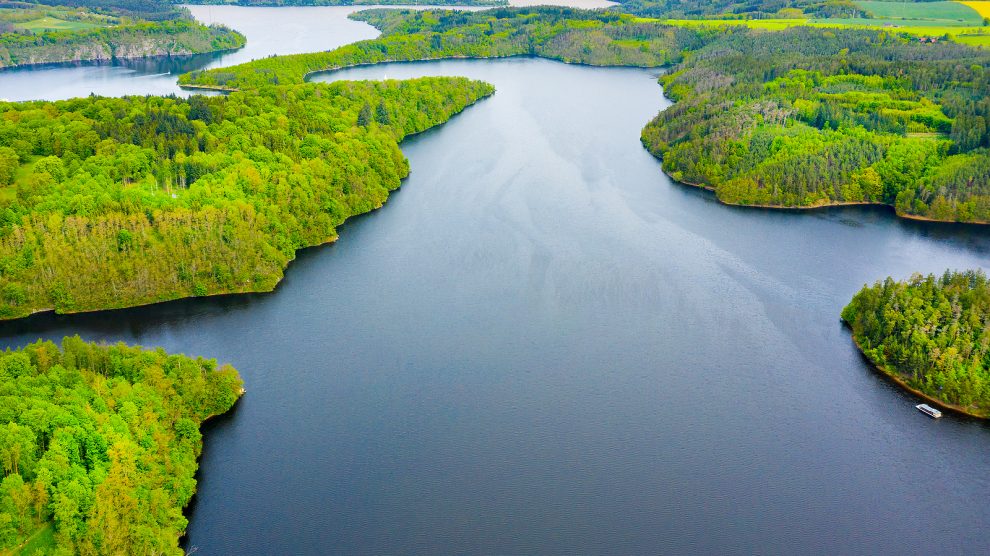Environmental groups want a ban on the financing of new hydropower projects. They say that while a new international standard is a step in the right direction, it does not go far enough towards protecting Central and Eastern Europe’s ‘saturated’ rivers.
Launched on September 8 at the World Hydropower Congress, a new hydropower standard is a commitment from the hydropower industry to reduce its negative impacts on rivers, communities and nature.
However, according to leading environmental groups, the new standard will not be enough to address the devastation the sector continues to wreak on ecosystems and biodiversity throughout Europe, particularly in Central and Eastern European rivers, which activists say are already saturated with hydropower.
- Not one solution, but many: Why decarbonisation relies on industry buy-in
- CEE’s illegal sturgeon trade is ‘systematic’, claims new report
- Could new Romanian law lead to ‘massacre’ of bears?
“One of the primary drivers of the decline of freshwater biodiversity in the Danube basin are dams and other water infrastructure that impact the natural habitats of freshwater species like Danube sturgeons, Danube salmon and other fish, otters, and thousands of other species in the region,” says Irene Lucius, regional conservation director, World Wildlife Fund (WWF) Central and Eastern Europe.
“In Europe we need to see a ban on the financing of new hydropower projects. Instead, investment in properly mitigating the impact of existing, damaging hydropower and more sustainable options like wind or solar power is needed.”
The WWF recognises however that the International Hydropower Association’s (IHA) commitments on protected areas – such as declaring World Heritage Sites ‘no go’ areas do represent a first, very small step forward for an industry that has thousands of projects planned or under construction in protected areas. It says that they are the first commitments the industry has ever made on protected areas.
Mitigating negative impact
IHA Chief Executive Eddie Rich says that renewable energy projects in Protected Areas should meet the highest performance standards and clearly demonstrate how they offer net-benefits to the wider environment.
“Hydropower can bring huge benefits as a low-carbon source of electricity, providing clean storage for solar and wind power and helping to protect energy systems against blackouts,” he says. “Billions of tonnes of carbon emissions are avoided every year by using hydropower instead of fossil fuels. As with any infrastructure project, however, even the construction of a renewable energy project may bring impacts to the local environment that must be mitigated.”
The WWF meanwhile says that the IHA commitments do not go nearly far enough and will continue to allow hydropower projects to be developed in protected areas, exacerbating the global nature crisis.
It warns that this has disastrous impacts on freshwater ecosystems and biodiversity, for example on sturgeon, salmon or eel, which need to migrate to survive.
Every new hydropower facility comes with additional negative impacts on freshwater ecosystems in Europe, which can only be mitigated to a limited extent and cannot be handled by nature. Furthermore, most of the planned facilities have a capacity of under 10 megawatts – about the same as two large onshore wind turbines – and so would make only a negligible contribution to renewable energy generation.
Of great concern is that one-third of these planned hydropower projects in the European Union are in protected areas, such as national parks and Natura 2000 sites, which should provide safe havens for Europe’s most vulnerable biodiversity.
A first major step
“The new IHA commitment is a major step forward by the hydropower industry in ensuring that hydropower projects do not affect World Heritage sites,” says Mechtild Rössler, director of the UNESCO World Heritage Centre. “The new commitment is in line with the established position of the World Heritage Committee, that the construction of dams with large reservoirs within the boundaries of properties is incompatible with their World Heritage status.
The WWF wants more stringent rules, however.
“Prohibiting hydropower projects in World Heritage Sites can be seen as the first step for the industry but it’s a very small step since this commitment does not rule out new developments in any other protected areas, including internationally protected wetlands,” says Stuart Orr, WWF’s global freshwater lead.
“The hydropower industry is clearly still committed to constructing dams and plants in protected areas, which will only exacerbate the nature crisis. WWF calls on the hydropower industry to urgently expand its ‘no-go’ commitments beyond World Heritage Sites to other nationally and internationally protected areas – to avoid the construction of thousands of planned projects in protected areas and prevent irreparable damage to more of the world’s most important places for people and nature.”
Bulgaria, Hungary, Slovakia, Romania and Ukraine combined already have more than 1,000 hydropower plants, with around 400 more planned or under construction.
The WWF says that they are “saturated”.
The organisation now wants the hydropower industry to now prove that the new commitments will be used to avoid the mistakes of the past and prevent irreparable damage to more of the world’s protected areas.
“Whether governments and developers will abide by the commitments or will continue to put profit before people and planet remains to be seen. If the commitments are rigorously implemented by all IHA members, there should be a rapid decline in the number of hydropower projects that are planned or under construction in protected areas,” the WWF said in a statement.
Unlike many news and information platforms, Emerging Europe is free to read, and always will be. There is no paywall here. We are independent, not affiliated with nor representing any political party or business organisation. We want the very best for emerging Europe, nothing more, nothing less. Your support will help us continue to spread the word about this amazing region.
You can contribute here. Thank you.



